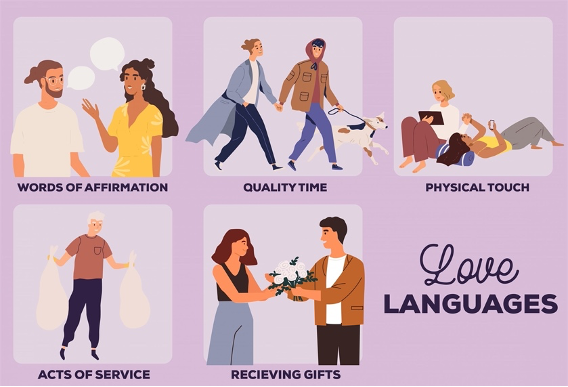Sometimes, we feel like we’re not receiving our loved one's affection. Could it be that they are expressing love in their love language, or perhaps a different one?
The concept of the Five Love Languages was introduced by Dr. Gary Chapman in his 1992 book The 5 Love Languages: The Secret to Love That Lasts. This theory claims that each person expresses and receives love uniquely. It also suggests that understanding our partner’s primary love language can significantly improve communication and strengthen relationships.
Here are the five love languages Dr. Gary Chapman describes:
Words of Affirmation
People whose primary love language is words of affirmation feel most loved when they receive verbal expressions of love, appreciation, or encouragement. Compliments, kind words, and sincere love expressions mean a lot to them.
Examples: Saying “I love you,” complimenting them, expressing gratitude, saying “Great job!” or “I appreciate everything you do.”Acts of Service
For some people, actions speak louder than words. Those with this love language feel loved when their partner does something for them, whether it’s completing a task, going somewhere, or helping with something important.
Examples: Cooking a meal, cleaning the house, completing an unfinished task, or fixing something that’s broken.Receiving Gifts
People with this love language feel loved when they receive thoughtful gifts. The value of the gift is not as important as the thought and effort behind it. It’s a way to express love, thoughtfulness, and care.
Examples: Giving a special gift for a birthday or holiday, surprising them with their favorite snack, or saying “I saw this and thought of you.”Quality Time
People who value quality time feel loved when their partner gives them their full attention. It’s not just about being in the same room; it’s about engaging in meaningful conversations or activities that foster connection and closeness.
Examples: Going for a walk together, having deep conversations, or spending a quiet evening together without distractions like phones or TV.Physical Touch
For those whose love language is physical touch, there is nothing more meaningful than physical affection. Physical contact can strengthen emotional bonds, reduce stress, and promote feelings of safety and connection.
Examples: Hugging, kissing, holding hands, cuddling, or even just a simple touch on the arm.
Why Are Love Languages Important?
Understanding your partner’s primary love language can make a huge difference in your relationship. For example, if your partner’s primary love language is “Acts of Service,” but you tend to express love through “Words of Affirmation,” there may be a disconnect. Your partner may not feel loved because they aren’t receiving love in their preferred way.
By learning and speaking each other’s love languages, you can build a deeper emotional connection and strengthen your relationship.



